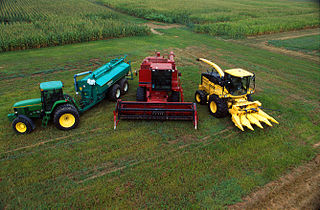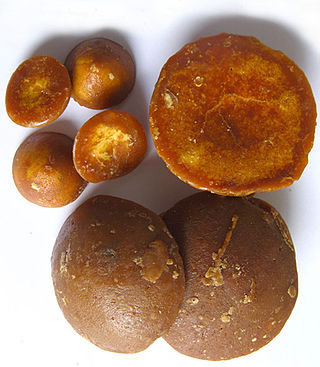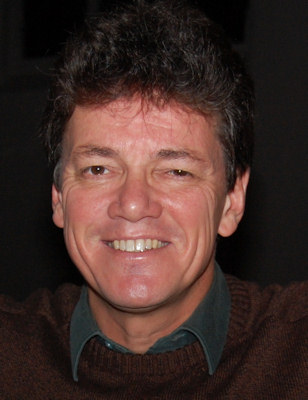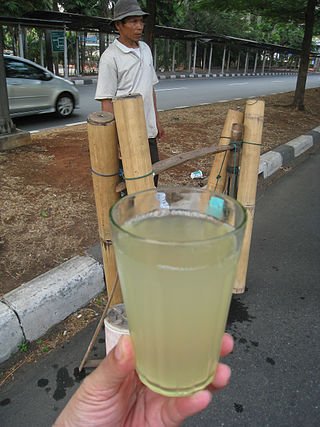
Masarang Foundation , or Yayasan Masarang in Indonesian language, is an Indonesian non-profit organization. One of its programs, The Masarang Palm Sugar Factory, succeeded as one of the finalists of The World Challenge in 2007 .

Masarang Foundation , or Yayasan Masarang in Indonesian language, is an Indonesian non-profit organization. One of its programs, The Masarang Palm Sugar Factory, succeeded as one of the finalists of The World Challenge in 2007 .

Masarang Foundation was established on January 17, 2001, by Notary Act No. 175, and since January 22, 2001, officially registered with the department of Justice in Tondano with registration number 02/YS/2001/PN.TDO. Masarang is based in Tomohon, North Sulawesi, Indonesia. With the motto "People, Planet, Profit", Masarang aims to achieve its goal to save the environment through the active role of the local people. [1]
Masarang Foundation has several programs, including scholarships, palm farmer groups, although the foundation is most notably for the Masarang Palm Sugar Factory program, that uses waste steam from the power plant to heat the sugar palm sap . The resulting high-quality product is now being successfully exported - with all profits going direct to the farmer's cooperative . The Masarang Palm Sugar Factory started its production after opening by President Susilo Bambang Yudhoyono on 14 January 2007 .

An agricultural subsidy is a government incentive paid to agribusinesses, agricultural organizations and farms to supplement their income, manage the supply of agricultural commodities, and influence the cost and supply of such commodities.

Palm wine, known by several local names, is an alcoholic beverage created from the sap of various species of palm trees such as the palmyra, date palms, and coconut palms. It is known by various names in different regions and is common in various parts of Africa, the Caribbean, South America, South Asia, Southeast Asia, and Micronesia.

East Nusa Tenggara is the southernmost province of Indonesia. It comprises the eastern portion of the Lesser Sunda Islands, facing the Indian Ocean in the south and the Flores Sea in the north. It consists of more than 500 islands, with the largest ones being Sumba, Flores, and the western part of Timor; the latter shares a land border with the separate nation of East Timor. The province is subdivided into twenty-one regencies and the regency-level city of Kupang, which is the capital and largest city.

Gunung Leuser National Park is a national park covering 7,927 km2 in northern Sumatra, Indonesia, straddling the border of Aceh and North Sumatra provinces, a fourth portion and three-fourths portion, respectively. The national park, settled in the Barisan mountain range, is named after Mount Leuser (3,119 m), and protects a wide range of ecosystems. An orangutan sanctuary at Bukit Lawang is located within the park. Together with Bukit Barisan Selatan and Kerinci Seblat National Parks, it forms a World Heritage Site, the Tropical Rainforest Heritage of Sumatra.

Agriculture in Thailand is highly competitive, diversified and specialized and its exports are very successful internationally. Rice is the country's most important crop, with some 60 percent of Thailand's 13 million farmers growing it on almost half of Thailand's cultivated land. Thailand is a major exporter in the world rice market. Rice exports in 2014 amounted to 1.3 percent of GDP. Agricultural production as a whole accounts for an estimated 9–10.5 percent of Thai GDP. Forty percent of the population work in agriculture-related jobs. The farmland they work was valued at US$2,945/rai in 2013. Most Thai farmers own fewer than eight ha (50 rai) of land.

Oei Tiong Ham, Majoor-titulair der Chinezen was a Chinese Indonesian tycoon and the son of Oei Tjie Sien, the founder of the Kian Gwan, a multinational trading company. Born in Semarang, Central Java, Dutch East Indies, he became the wealthiest person in Asia at the start of the twentieth century. Part of his wealth originated in his involvement in the sugar industry. He served as Luitenant der Chinezen in the Dutch colonial administration in Semarang, and was raised to the rank of titular Majoor upon retirement.

Agriculture in Colombia refers to all agricultural activities, essential to food, feed, and fiber production, including all techniques for raising and processing livestock within the Republic of Colombia. Plant cultivation and livestock production have continuously abandoned subsistence agricultural practices in favour of technological farming resulting in cash crops which contribute to the economy of Colombia. The Colombian agricultural production has significant gaps in domestic and/or international human and animal sustenance needs.
The Fanjul family —Cuban born brothers Alfonso "Alfy" Fanjul Jr., José "Pepe" Fanjul, Alexander Fanjul, and Andres Fanjul—are owners of Fanjul Corp., a vast sugar and real estate conglomerate. It comprises the subsidiaries Domino Sugar, Florida Crystals, C&H Sugar, Redpath Sugar, former Tate & Lyle sugar companies, and American Sugar Refining. Fanjul Corp. also owns a 35% stake in Central Romana Corporation of La Romana, Dominican Republic.

Agriculture in Indonesia is one of the key sectors within the Indonesian economy. In the last 50 years, the sector's share in national gross domestic product has decreased considerably, due to the rise of industrialisation and service sector. Nevertheless, for the majority of Indonesian households, farming and plantation remains as a vital income generator. In 2013, the agricultural sector contributed 14.43% to national GDP, a slight decline from 2003's contribution which was 15.19%. In 2012, the agricultural sector provides jobs to approximately 49 million Indonesians, representing 41% of the country's total labor force.

Coconut sugar is a palm sugar produced from the sap of the flower bud stem of the coconut palm.

The use of biofuels varies by region. The world leaders in biofuel development and use are Brazil, United States, France, Sweden and Germany.

The Borneo Orangutan Survival (BOS) Foundation is an Indonesian non-profit non-governmental organization founded by Dr. Willie Smits in 1991 and dedicated to the conservation of the endangered Bornean orangutan and its habitat through the involvement of local people. It is audited by an external auditor company and operates under the formal agreement with the Indonesian Ministry of Forestry to conserve and rehabilitate orangutans. The BOS Foundation manages orangutan rescue, rehabilitation and re-introduction programmes in East and Central Kalimantan. With more than 400 orangutans in its care and employing more than 440 people at a 10 sites BOS Foundation is the biggest non-human primate conservation non-governmental organization worldwide. Nyaru Menteng and Samboja Lestari are the BOS Foundation sites that have received most extensive media coverage. Nyaru Menteng, founded by Lone Drøscher Nielsen, has been the subject of a number of TV series, including Orangutan Diary, Orangutan Island and the series Orangutan Jungle School, airing since 2018.

Palm oil, produced from the oil palm, is a basic source of income for many farmers in South East Asia, Central and West Africa, and Central America. It is locally used as cooking oil, exported for use in much commercial food and personal care products and is converted into biofuel. It produces up to 10 times more oil per unit area than soybeans, rapeseed or sunflowers.
Wilmar International Limited is a Singaporean food processing and investment holding company with more than 300 subsidiary companies. Founded in 1991, it is one of Asia's leading agribusiness groups alongside the COFCO Group. It ranks amongst the largest listed companies by market capitalisation on the Singapore Exchange (SGX), being the second largest as of September 2010. It was ranked 211th in the Fortune Global 500 list in 2020. It was ranked 3rd in the World's Most Admired Company by Fortune in 2019.

Deforestation in Indonesia involves the long-term loss of forests and foliage across much of the country; it has had massive environmental and social impacts. Indonesia is home to some of the most biologically diverse forests in the world and ranks third in number of species behind Brazil and the Democratic Republic of Congo.

Willie Smits is a trained forester, a microbiologist, conservationist, animal welfare activist, wilderness engineer and social entrepreneur. He has lived in Indonesia since 1985 and is an Indonesian citizen. He is married to Adrienne C. Watson since March 2016.

Tongseng is an Indonesian goat meat, mutton or beef stew dish in curry-like soup, with vegetables and kecap manis. Tongseng is commonly found in the Indonesian region of Central Java; from Surakarta to Yogyakarta. However, it is believed that the dish originated from Klego district in Boyolali, Central Java.

The economic history of Indonesia is shaped by its geographic location, its natural resources, as well as its people that inhabited the archipelago that today formed the modern nation-state of the Republic of Indonesia. The foreign contact and international trade with foreign counterparts had also shaped and sealed the fate of Indonesian archipelago, as Indians, Chinese, Arabs, and eventually European traders reached the archipelago during the Age of Exploration and participated in the spice trade, war and conquest.
PPB Group Berhad is a Malaysian diversified conglomerate which engages in food production, agriculture, waste management, film distribution, property investment and development. PPB is also the single largest shareholder of Wilmar International, one of the leading palm oil producers and agribusiness companies in the world.

Lahang is a traditional sweet and cold beverage from West Java, Indonesia, made from the sap of Arenga pinnata. The drink is commonly known in Indonesia; however, it is usually associated with the Sundanese of West Java. It is known as a traditional isotonic drink.